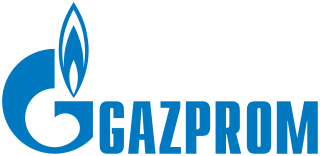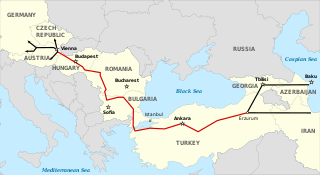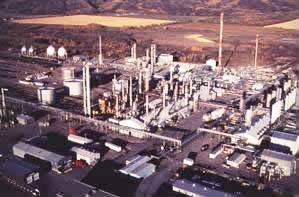Related Research Articles

Natural gas, is a naturally occurring hydrocarbon gas mixture consisting primarily of methane, but commonly including varying amounts of other higher alkanes, and sometimes a small percentage of carbon dioxide, nitrogen, hydrogen sulfide, or helium. It is formed when layers of decomposing plant and animal matter are exposed to intense heat and pressure under the surface of the Earth over millions of years. The energy that the plants originally obtained from the sun is stored in the form of chemical bonds in the gas.

Pipeline transport is the long-distance transportation of a liquid or gas through a system of pipes—a pipeline—typically to a market area for consumption. The latest data from 2014 gives a total of slightly less than 2,175,000 miles (3,500,000 km) of pipeline in 120 countries of the world. The United States had 65%, Russia had 8%, and Canada had 3%, thus 75% of all pipeline were in these three countries.

The Federal Energy Regulatory Commission (FERC) is the United States federal agency that regulates the transmission and wholesale sale of electricity and natural gas in interstate commerce and regulates the transportation of oil by pipeline in interstate commerce. FERC also reviews proposals to build interstate natural gas pipelines, natural gas storage projects, and liquefied natural gas (LNG) terminals, in addition to licensing non-federal hydropower projects.

PJSC Gazprom is a partially state-owned multinational energy corporation headquartered in the Lakhta Center in Saint Petersburg, Russia. As of 2019, with sales over USD$120 billion, it sits as the largest publicly-listed natural gas company in the world and the largest company in Russia by revenue. In the 2019 Forbes Global 2000, Gazprom was ranked as the 40th largest company in the world. Gazprom name is a portmanteau of the Russian words Gazovaya Promyshlennost.

TC Energy Corporation is a major North American energy company, based in Calgary, Alberta, Canada, that develops and operates energy infrastructure in Canada, the United States, and Mexico. The company operates three core businesses: Natural Gas Pipelines, Liquids Pipelines and Energy.

El Paso Corporation was a provider of natural gas and related energy products and was one of North America's largest natural gas producers until its acquisition by Kinder Morgan in 2012. It was headquartered in Houston, Texas. United States.
Phoenix Natural Gas is the largest gas distribution business in Northern Ireland, being the owner and operator of the licence for the distribution network in the Greater Belfast area. The distribution business is responsible for the development of the pipeline network and also for providing a 24/7 operational and transportation service platform to suppliers under the rules of the company's network code. The ongoing investment within the Phoenix Natural Gas licence area does not attract any grant or support from local or UK government. The investment is a standalone private venture.

Nord Stream (former names: North Transgas and North European Gas Pipeline; Russian: Северный поток, Severny potok) is a system of offshore natural gas pipelines from Russia to Germany. It includes two lines running from Vyborg to Greifswald forming original Nord Stream (Nord Stream 1), and two lines running from Ust-Luga to Greifswald termed Nord Stream 2. Nord Stream is owned and operated by Nord Stream AG, whose majority shareholder is the Russian state company Gazprom, and Nord Stream 2 is owned and will be operated by Nord Stream 2 AG, a wholly owned subsidiary of Gazprom. The first line of Nord Stream was laid by May 2011 and was inaugurated on 8 November 2011. The second line of Nord Stream was laid in 2011–2012 and was inaugurated on 8 October 2012. At 1,222 km (759 mi) in length, Nord Stream is the longest sub-sea pipeline in the world, surpassing the Langeled pipeline. Laying Nord Stream 2 was carried out in 2018–2019, and before the imposition of U.S. sanctions which halted the work, it was expected to become operational in mid-2020. Nord Stream has a total annual capacity of 55 billion m3 (1.9×1012 cu ft) of gas, and the addition of Nord Stream 2 is expected to double the capacity to a total of 110 billion m3 (3.9×1012 cu ft). Both projects have been opposed by the United States as well as several Central and Eastern European countries because of concerns that it would increase Russia's influence in the region. The U.S. resistance of Nord Stream 2 is also influenced by the country's increased production of natural gas, which gives the U.S. Congress economic incentive to resist the Russian supply of gas to the EU, in favour of U.S. shale gas.

The Nabucco-West pipeline was a proposed natural gas pipeline from the Turkish-Bulgarian border to Austria. It was a modification of the original Nabucco Pipeline project, which was to run from Erzurum in Turkey to Baumgarten an der March in Austria. The aim of the Nabucco pipeline was to diversify the natural gas suppliers and delivery routes for Europe, thus reducing European dependence on Russian energy. The original project was backed by several European Union member states and by the United States, and was seen as a rival to the South Stream pipeline project. The main supplier was expected to be Iraq, with potential supplies from Azerbaijan, Turkmenistan, and Egypt. The main supply for the Nabucco West was to be Shah Deniz gas through the proposed Trans-Anatolian gas pipeline (TANAP).

Kinder Morgan, Inc. is one of the largest energy infrastructure companies in North America. The company specializes in owning and controlling oil and gas pipelines and terminals.

Natural gas prices, as with other commodity prices, are mainly driven by supply and demand fundamentals. However, natural gas prices may also be linked to the price of crude oil and petroleum products, especially in continental Europe. Natural gas prices in the US had historically followed oil prices, but in the recent years, it has decoupled from oil and is now trending somewhat with coal prices.
The Alaska gas pipeline is a joint project of TransCanada Corp. and ExxonMobil Corp. to develop a natural gas pipeline under the AGIA, a.k.a. the Alaska Gas Inducement Act, adopted by Alaska Legislature in 2007. The project originally proposed two options during its open season offering over a three-month period from April 30 to July 30, 2010. An 'open season' in layman's terms is when a company conducts a non-binding show of interest or poll in the marketplace, they ask potential customers "if we build it, will you come?".

The oil and gas industry is usually divided into three major components: upstream, midstream and downstream. The midstream sector involves the transportation, storage, and wholesale marketing of crude or refined petroleum products. Pipelines and other transport systems can be used to move crude oil from production sites to refineries and deliver the various refined products to downstream distributors. Natural gas pipeline networks aggregate gas from natural gas purification plants and deliver it to downstream customers, such as local utilities.

The Arab Gas Pipeline is a natural gas pipeline in the Middle East. It originates near Arish in the Sinai Peninsula and was built to export Egyptian natural gas to Jordan, Syria, and Lebanon, with branch underwater and overland pipelines to and from Israel. It has a total length of 1,200 kilometres (750 mi), constructed at a cost of US$1.2 billion.

Natural-gas processing is a range of industrial processes designed to purify raw natural gas by removing impurities, contaminants and higher molecular mass hydrocarbons to produce what is known as pipeline quality dry natural gas.

Gail (India) Limited (GAIL) is Government of India undertaking company. Gail is the largest state-owned natural gas processing and distribution company in India. It is headquartered in New Delhi. It is a state-owned enterprise of the Government of India, under the administrative control of the Ministry of Petroleum and Natural Gas. It has the following business segments: natural gas, liquid hydrocarbon, liquefied petroleum gas transmission, petrochemical, city gas distribution, exploration and production, GAILTEL and electricity generation. GAIL was conferred with the Maharatna status on 1 Feb 2013, by the Government of India. Only eight other Public Sector Enterprises (PSEs) enjoy this coveted status amongst all central CPSEs. GAIL was listed in the 131st position among India's most trusted brands according to the Brand Trust Report 2014, a study conducted by the Trust Research Advisory.
A compressor station is a facility which helps the transportation process of natural gas from one location to another. Natural gas, while being transported through a gas pipeline, needs to be periodically pressurized at intervals of 40 to 100 miles. Siting is dependent on terrain, and the number of gas wells in the vicinity. Frequent elevation changes and a greater number of gas wells will require more compressor stations.
The United Kingdom's National Transmission System (NTS) is the network of gas pipelines that supply gas to about forty power stations and large industrial users from natural gas terminals situated on the coast and to gas distribution companies that supply commercial and domestic users.

The Russian Federation supplies a significant volume of fossil fuels and is the largest exporter of oil, natural gas and hard coal to the European Union. In 2017, energy products accounted around 60% of the EU's total imports from Russia. According to Eurostat, 30% of the EU's petroleum oil imports and 39% of total gas imports came from Russia in 2017. For Estonia, Poland, Slovakia and Finland, more than 75% of their imports of petroleum oils originated in Russia.
References
- ↑ "Federal Energy Regulatory Commission". Archived from the original on 2013-01-20. Retrieved 2012-08-12.